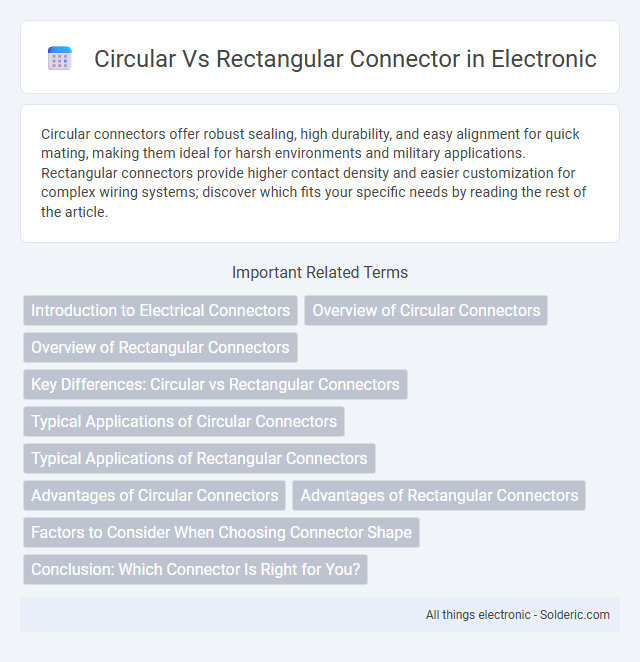Circular connectors offer robust sealing, high durability, and easy alignment for quick mating, making them ideal for harsh environments and military applications. Rectangular connectors provide higher contact density and easier customization for complex wiring systems; discover which fits your specific needs by reading the rest of the article.
Comparison Table
| Feature | Circular Connector | Rectangular Connector |
|---|---|---|
| Shape | Round | Rectangular |
| Space Efficiency | Less efficient | More efficient for high-density layouts |
| Durability | High mechanical strength, resistance to vibration | Moderate mechanical strength |
| Sealing | Excellent waterproof and dustproof sealing | Sealing depends on design; generally less effective |
| Contact Count | Typically fewer contacts, up to 40+ | Supports higher contact counts, 50+ common |
| Application | Military, aerospace, industrial, harsh environments | Telecommunications, consumer electronics, computing |
| Ease of Mating | Quick connect/disconnect with locking mechanisms | May require precise alignment and multiple screws |
| Cost | Generally higher due to rugged design | Typically lower for equivalent contact count |
Introduction to Electrical Connectors
Electrical connectors serve as critical components for establishing reliable electrical connections between devices and systems. Circular connectors feature a round shape, providing robust durability, environmental sealing, and easy mating alignment, making them ideal for military, aerospace, and industrial applications. Rectangular connectors offer higher pin density and modularity, enabling efficient space utilization and adaptability for complex wiring in telecommunications, computing, and automation systems.
Overview of Circular Connectors
Circular connectors feature a cylindrical shape with a round mating interface, offering robust and reliable connections in harsh environments. Commonly used in military, aerospace, and industrial applications, they provide excellent sealing against dust, moisture, and vibration. Their design supports easy alignment and secure locking mechanisms, enhancing durability and electrical performance.
Overview of Rectangular Connectors
Rectangular connectors feature a box-shaped housing designed for robust mechanical stability and ease of alignment in multi-pin configurations. Commonly used in industrial, military, and aerospace applications, they support high-density contacts enabling reliable signal and power transmission in compact spaces. Their modular design allows for versatile mounting options and efficient cable management, making them ideal for complex electronic systems requiring secure and durable connections.
Key Differences: Circular vs Rectangular Connectors
Circular connectors offer superior durability and environmental sealing, making them ideal for harsh and outdoor applications, while rectangular connectors provide higher contact density and easier stacking for compact electronic assemblies. The shape influences installation and space requirements: circular connectors facilitate quick mating and alignment, whereas rectangular connectors are designed for modular configurations with multiple rows of pins. Your choice depends on specific needs such as mechanical robustness, space constraints, and electrical performance.
Typical Applications of Circular Connectors
Circular connectors are widely used in military, aerospace, and industrial automation due to their robust design and ability to withstand harsh environments. You can find them in applications such as aircraft systems, medical devices, and outdoor telecommunications equipment, where reliable sealing and vibration resistance are critical. Their versatile pin configurations and rugged construction make them ideal for mission-critical and portable electronic devices.
Typical Applications of Rectangular Connectors
Rectangular connectors are commonly used in industrial automation, telecommunications, and military equipment due to their high-density pin configurations and robust locking mechanisms. These connectors are ideal for harsh environments where reliable, secure connections are essential in aerospace systems, medical devices, and transportation electronics. Their modular design supports complex wiring systems, making them suitable for data centers, control panels, and network infrastructure applications.
Advantages of Circular Connectors
Circular connectors offer superior durability and resistance to environmental factors such as dust, moisture, and vibration, making them ideal for harsh industrial and outdoor applications. Their compact, symmetrical shape enables easier alignment and faster mating compared to rectangular connectors, enhancing assembly efficiency. You benefit from reliable electrical performance and enhanced mechanical strength with circular connectors, especially in demanding conditions.
Advantages of Rectangular Connectors
Rectangular connectors offer greater contact density, enabling more connections within a compact footprint, which is ideal for complex electronic systems. Their robust design ensures superior mechanical stability and ease of assembly in densely packed environments. You can benefit from versatile configurations and better integration options in various industrial and military applications.
Factors to Consider When Choosing Connector Shape
Choosing between circular and rectangular connectors depends on factors like available installation space, environmental conditions, and mechanical durability requirements. Circular connectors offer superior resistance to dust, moisture, and vibration, making them ideal for harsh industrial or outdoor environments. Your choice should also consider cable density and ease of mating, as rectangular connectors typically provide higher pin counts and better suitability for compact electronic devices.
Conclusion: Which Connector Is Right for You?
Choosing between circular and rectangular connectors depends on your specific application needs, such as space constraints, environmental protection, and ease of assembly. Circular connectors offer robust sealing and durability ideal for harsh conditions, while rectangular connectors provide high-density pin configurations suited for complex wiring requirements. Evaluate your design priorities to determine which connector best aligns with your performance and installation criteria.
Circular vs Rectangular connector Infographic

 solderic.com
solderic.com